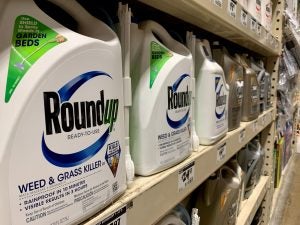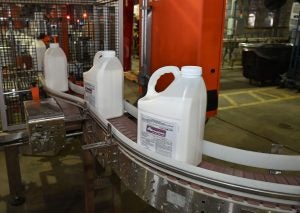Political television commercials are the worst, and so is Joe Rogan at bringing relevant farming and ranching voices to his podcast. We’re gearing up for state and national elections over the next year, and before long, the attack ads, disclaimers, and general unpleasantries will be everywhere.
Robert F. Kennedy Jr. is well-known for his vaccine skepticism and conspiracy theories. But with political discontent rising as President Joe Biden and former President Donald J. Trump prepare for a seemingly inevitable faceoff, the son of one of American history’s most famous assassinated senators has thrown his hat into the 2024 election ring.
Kennedy’s affinity for conspiracy theories doesn’t stop with anti-vaccine rhetoric — he’s taken a decided agricultural spin on his talking points by targeting pesticides and GMOs, which isn’t new to the environmental lawyer’s crosshairs. Or his purveyor, Rogan.
In just one nearly nine-minute video hosted on the Joe Rogan Experience, Kennedy manages to briefly cover glyphosate, workers in agriculture, biotech crops, and atrazine.
And while glyphosate seems a strange target to mount a presidential campaign on, it’s certainly a topic that has received plenty of press over the years. Not to mention, large-scale cases attract investors. They’re big business.
In fact, Kennedy served as a lawyer in the first lawsuit against then Monsanto’s herbicide Roundup, the Johnson v. Monsantao Co. case, a $289 million suit that Monsanto, and later, Bayer appealed and then lost. Eventually, the award was reduced to $21 million after appeals.
Funny that in stoking the fires of these farm topics, Kennedy, a Democrat, takes less than 10 minutes to ask for funding to support his campaign for president.
In the cases against Roundup and its active ingredient, glyphosate, pesticide regulatory agencies have denied any conclusion saying that data supports an association with glyphosate and non-Hodgkin’s lymphoma. That hasn’t stopped the lawsuits and juries from million-dollar verdicts (and sometimes billion-dollar ones) as they empathized with terminally ill users.
The now-Bayer product has been the crux of hundreds of thousands of lawsuits, and the target of activists speaking out against modern agricultural practices. In fact, as the most common weedkiller in the U.S., Roundup is hailed as one of the safest herbicides on the market and is used in both agricultural and residential applications.
Independently, nearly all scientific bodies and associated research have affirmed the safety of glyphosate.

Kennedy’s video well-illustrates the continued play on Americans’ fears and buy-in to “Big Ag” and “Big Chemical” conspiracy theories. In fact, his explanation of glyphosate’s dangers specifically begins with the tie of glyphosate to Roundup-ready biotech corn. And according to Kennedy, Roundup is being used in place of good, old-fashioned labor.
“They saturate the entire landscape with glyphosate. Everything dies except for the Roundup-ready corn,” says Kennedy. “Not the field. The entire landscape. Everything dies,” says Kennedy. “This is something every American should be concerned about.”
In the agriculture industry, we recognize that pesticides are an important part of crop health. In fact, overall pesticide use is trending downward in the U.S. and up to 80 percent of the world’s food production would be lost without farmers’ ability to protect their crops. That’s because pesticides work by hurting other species — this is, after all, how they work.
But using more chemicals than necessary would be a waste of money and negatively impact land that is often intended to be passed on to subsequent generations. Plus, terms like “saturate” or “drench” are common buzzwords people use to stoke anger against farming communities.
Based on Kennedy’s assessment, glyphosate must be indisputably bad for the environment and humans. However, in June 2022, the U.S. Court of Appeals for the Ninth Circuit vacated a human health portion of the glyphosate ID and found that glyphosate did not result in human health risks to children or adults and is not likely carcinogenic.
In September 2022, the U.S. Environmenal Protection Agency was unable to meet a court-ordered deadline addressing its review of the remaining portions of glyphosate. The final review won’t be completed until 2026.
Pesticide review, regulation, and registration are typically completed using the Federal Insecticide, Fungicide, and Rodenticide Act. The EPA looks at the best available science and weighs the active ingredient’s approval against the product’s benefits and how the pesticide impacts humans, animals, and the environment. Products are then sold with labels that carefully address safe and practical applications.
“So of all of the diseases that are probably caused, probably, almost certainly caused by glyphosate, the only one to pass that threshold was the case that we brought for Hodkins, non-Hodkin’s lymphoma,” ascertains Kennedy.
Kennedy goes on to discuss in his video the mass-spraying of glyphosate on wheat and its connection with celiac disease and gluten allergies beginning in 2006. Here Kennedy contradicts himself. Again. Because there’s no direct result documented — at least he’s willing to admit it.

This is where Rogan’s show takes another turn. Kennedy addresses the dangers of phytates — specifically, atrazine. “It’s ubiquitous. It’s everywhere,” he says, referencing a study where the impact of atrazine on amphibians in the wild was measured.
While the study measured the rate at which African clawed frogs produced hermaphroditic offspring after atrazine exposure, it was paid for by Syngenta, the producer of atrazine. And, it was not reliably replicated with the same results.
The study also fails to mention that several frog species will become hermaphrodites based on social or environmental stimuli. Sensational, but there are far more factors to scientifically study, and review than what was actually presented, and dug back up by Kennedy. Kind of reminiscent of the infamous Séralini “study, a (now retracted) paper that positioned rats predisposed to developing tumors on a long-term GMO corn diet.
Last year, college professor and plant expert Tim Durham also reviewed a peer-reviewed paper out of Florida Atlantic University that exposed a species of roundworm to glyphosate-inducing seizures in the worms. The specific strain of nematodes used is known to be especially vulnerable to extended convulsion times when stressed.
Kennedy’s strategy of pitting glyphosate, GMOs, and atrazine against human and environmental health crises makes sense. According to Forbes (and other sources), Kennedy made other baseless claims over the years involving gun ownership, the COVID-19 pandemic’s origins, and vaccines.
These topics garner attention and they garner funding. Based on Kennedy’s previous success against glyphosate, we will likely continue to see ploys regarding ag-centric conspiracy theories. Stay braced. Stay educated.


